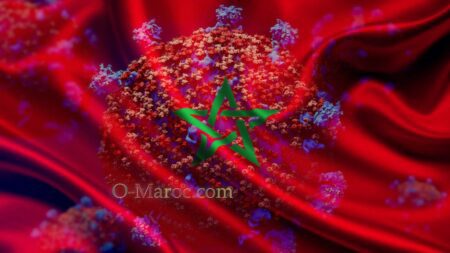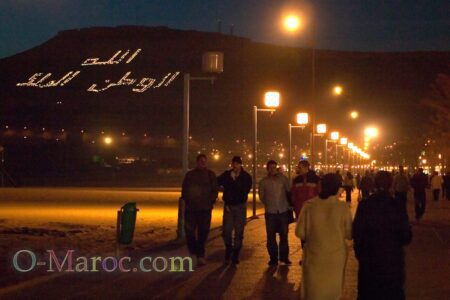You may have missed this news: last Friday, Fouad Mourtada, a young Moroccan engineer, was sentenced to three years in prison and fined 10,000 dirhams for creating a false Facebook profile in the name of the King’s younger brother.The profile had only been online for a few days, with Moulay Rachid’s name, but the photo of Fouad Mourtada, who is very different (you’d have to know the face of the King’s brother to know that).

The profile was closed – without any email having been sent with it – and on Tuesday 5 February Fouad was arrested at his home, questioned so hard that he lost consciousness. His family was informed only on Wednesday.
A MAP press release was put online and quickly withdrawn, informing of the case and Fouad’s fraud. Fouad’s family, who live partly in Morocco and partly in Canada, set up a website called “Help Free Fouad”, and Fouad was charged with criminal conspiracy. His release was refused, and on the 22nd he was sentenced (his lawyer is appealing).
The case was mentioned on CNN, all over the world, and of course in an extremely negative light.
This was an extremely heavy sentence in our eyes, in the eyes of the Moroccan blogoma, in the eyes of Moroccans living abroad, in the eyes of Moroccans who are in favour of democratisation of the country, a sentence that was all the heavier because the law had been broken, and to pronounce it, while in spirit there was indeed an offence, which can be summed up as “undermining the sanctity of the royal family”, in letter, the definition of this offence did not cover what Fouad had done. (A detailed analysis by a Moroccan jurist, who explains much better than I can).
The sentence was moderate, however, compared to the maximum penalty (still for breaking the law), which was five years, and moderate compared to the huge fines (several hundred thousand euros) that newspapers had to pay for simply writing the jokes that everyone repeats.
And above all, to my great surprise,
A condemnation that leaves a large part of Morocco indifferent
Talking around me, with my husband, with people who – like the vast majority of Moroccans – don’t frequent the little bubble of the blogosphere and Web 2. 0 bubble, for lack of Internet access, education, interest or time… I was surprised to hear many people whose opinions I respect, whom I don’t regard as bloodthirsty brutes, would-be dictators, or servile people who approve of everything that the authorities do, just ordinary people, say to me – in a nutshell – so what?
So what? He knew what he was risking, didn’t he? You don’t attack the royal family and that’s that.
So what ? If he made this profile, it’s to use it, it’s just that he was prevented from doing so beforehand.
So what ? He was arrested and beaten up? Yes, like everyone else, but you know, the police here aren’t very kind, it’s true, but we Moroccans are difficult, we’re like cumin, you have to squeeze us to get the flavour out. (To get something good out of it).
So what ? And if we don’t stop him, the next one will make a profile and swindle people by pretending to be the prince …
So what ? He’s an engineer, what need did he have to do that, he went to military school, he knows the risks.
And that made me think. I was shocked and I’m still shocked by torture, but I’m not surprised, because I know that these beatings are commonplace (but not only in Morocco…).
It’s true that political power in Morocco is not kind. It has been for a long time. A hundred years ago, when a minister was deposed, he was hanged or drawn and quartered, all his property seized, his family killed or reduced to poverty, his concubines raped or locked up in the victor’s harem – and that’s why all that remains are the walls of the Palais Bahia.
Not so long ago, in the 1950s, one of the descendants of the lords of the Atlas who had been ousted by the Alawites at the beginning of the century, more than fifty years after a member of his family had been executed for treason, tried to take revenge by attempting to assassinate the king.
Even more recently, Hassan II has had to defend his life three times. At least once in a face-off where it was kill or be killed. How many of our democratic leaders have found themselves in this situation?
The King is sacred in Morocco
Sacred in the original sense of the word.
The Fouad Mourtada affair has shown that while the words “crime de lèse-majesté” may have lost their meaning in the Wast, they remain charged with meaning in Morocco. At least for those in power.
We don’t touch the royal family. The royal family is only shown what it wants to be seen, and only said what it agrees to be said. One of the reasons why Moulay Abd El Aziz lost his throne was that he had not mastered his image; photos taken in the Palace circulated and deeply shocked Moroccans.
Clearly, this is a red line with which all Moroccans are familiar.
This raises the question of the gap between modern Morocco and traditional Morocco
Not condemning Fouad in the name of modernity and the insignificance of his act would have surprised traditional Morocco and would have been seen as a sign of weakness.
Moroccan sultans are not forgiving people. The tradition of power knows no forgiveness. And when that tradition goes back so far, forgiveness may well be understood not as such, but as weakness or an invitation to do more.
I think Fouad had a bit of bad luck
His first misfortune was that his ‘case’ occurred just as a raid on Islamists was being finalised. The kind of situation where ‘those in the know’ are on their toes, ready to check everything three times over.
Secondly, Fouad is from Goulmima. There are ‘ultras’ in Morocco, who demand secularism and democracy, and who are concentrated in the old ‘bled siba’, the land of dissidence that was never really subjugated, of which Goulmima is one of the strongholds. And his family is now in Oujda, in the Rif, another stronghold of resistance.
Basically, being from Goulmima and coming from Oujda means being the son of a Corsican and a Basque who lived in Brittany in the 80s.
Fouad may have had nothing to do with all that, but his origin was intrinsically an additional suspicion.
But above all, I’m convinced that Fouad’s misfortune was that he was mentioned. A press release issued a little too quickly by the local press agency, MAP, was immediately withdrawn, but not quickly enough to go unnoticed, and the Moroccan web, blogs and Facebook, went wild.
We’ll never know why this press release was issued, probably by an over-zealous policeman, proud of having pulled out a ‘big fish’, and to make himself look good (compared to his little comrades who were hunting the Islamist?), before realising that it wasn’t that, hence the withdrawal.
But it was too late. From the moment we started talking about Fouad, from the moment pressure was put on the authorities, it became impossible to back down, to release Fouad once he had been lectured and cleared of his so-called frauds. (Since this motive was not recognised, I believe, at the trial).
You have to understand what it’s like to govern a country where more than half the adult population is illiterate. In our country, an illiterate person is the exception. And despite everything, he is inundated with information, he is in a context where everyone around him knows how to read.
The more I practise traditional Morocco, the more I recognize its profound ignorance
Ignorance that is almost inconceivable to us. The same ignorance that, a few centuries ago, allowed witches to be burned. An ignorance that allows the smooth talker to make people believe anything.
Sometimes, when I’m asked questions, I, the ‘scholar’, widen my eyes in disbelief. The last one was, in the middle of Ouarzazate, from a man with a good job who knows how to read and write: “Is it true that there are children who slept for several years in their mother’s womb before being born?
A few days ago, in M’semrir, not far from Goulmima, in Siba country, again, students “pushed” villagers to demonstrate against the government. But they courageously ducked during the demonstration.
Every day there is rubbish circulating about the royal family on the internet, rubbish that would send any journalist to court in our country, that would send anyone to face a heavy sentence.
From the moment the ‘Mourtada case’ became known throughout the world, it was unthinkable to turn back, because for the people of Morocco, who normally know nothing about such things, it would have meant crossing the red line.
Fouad is almost certainly totally innocent of any concrete act, and in any case, even if he has ‘done’ something, it is very benign. In our eyes, it’s undignified to beat people up and imprison them for nothing. Moroccan law is based on French law, and people should not be imprisoned and even less convicted on the basis of intentions, but on the basis of facts.
But we are not Moroccans, or at least we are not the majority of Moroccans. If the majority of a country understands and accepts this condemnation, then it is this majority that needs to be changed. With education and hard work.
It was Brecht who said “first the food, then the morals”.
30% of the Moroccan population lives below the poverty line.
When I talk about scams and Harry, I’m referring to stories of everyday swindling, the usual and common pitfalls of those who are prepared to do anything to earn a few dirhams.
This is where the kids who throw stones at tourists can be found, when the tourists won’t let themselves be held to ransom for “one dirham, one euro”. And these kids are calmed down by the Moroccan police with sticks. Because that seems to be the only way at the moment.
It’s a great pity.
That’s just the way it is.
Things are slowly changing
You are brought up by your school, by your parents, by your grandparents.
It takes more than a decade to change the mentality of a people. Two generations, in general.
Mohammed VI has introduced a quasi-revolutionary family code. He is destroying shanty towns and supporting adult education programmes. He is fighting ignorance and trying to develop his country as quickly as possible.
And he’s letting his country’s heavy-handed justice system take its course, because that’s what has kept things safe until now.
This weekend, as I was expressing my indignation, some Moroccans said to me “well, we’ll release him, and then what? Do you want us to be attacked in the streets here like in Tanger, like Algeria with the bombs?”
But these are just “some” Moroccans, the country is not homogenous, and the gap between the three populations, the “Europeanised” Moroccans, the “middle-class” Moroccans, and the “working-class” Moroccans, is getting bigger and bigger, and harder and harder to manage.
The water level in a barrel is determined by its lowest plank. And this is the board of people for whom it is normal to condemn Fouad Mourtada. People who also spend years in prison when they cross the red line.
Five years in prison for the computer pirates who copy the CDs in Derb Ghalef, also an extremely heavy sentence. Three years in prison for Fouad. Another 95-year-old man dies in prison for allegedly insulting the king on a bus.
In Thailand, insulting the king carries a ten-year prison sentence.
There’s always worse elsewhere, always better elsewhere
Countries that tried to evolve too quickly exploded in mid-air, like Iran.
Countries that embraced democracy from one day to the next, without learning the ropes, fell back into dictatorship, like Russia.
Morocco is following a dangerous and difficult path, and I often compare the King’s position to that of a ninja on the edge of a precipice, holding back each cliff by his toes to prevent it from slipping away.
The Mudawana was a big step towards the advocates of modernity; the condemnation of Fouad Mourtada is a big step towards tradition.
I remain indignant about the Mourtada ‘case’, as I was about the Ksar El Kebir trial, but I am even more indignant about the state of misery and ignorance that makes this possible and acceptable to Moroccans.
The essential struggle in this country is not that of a blogosphere bursting into flames over the “first blogger to be imprisoned in Morocco” (which is technically not true, Fouad was not a blogger, he was a Facebooker), it is the struggle against ignorance and for development, a struggle that many Moroccan bloggers “from abroad” are totally ignoring.
Fouad’s family, who have shown great mastery of the internet buzz in organising support, were indignant when a policeman asked Fouad “why did you create Facebook?”. On the contrary, it reveals the widespread ignorance of modernity, of Web 2.0… and of what the Moroccan man in the street may or may not have understood about this case.
 A typo or syntax error? You can select the text and hit Ctrl+Enter to send us a message. Thank you! If this post interested you, maybe you can also leave a comment. We'd love to exchange with you !
A typo or syntax error? You can select the text and hit Ctrl+Enter to send us a message. Thank you! If this post interested you, maybe you can also leave a comment. We'd love to exchange with you !


 Mohammed VI
Mohammed VI

